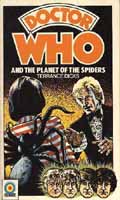Planet of the Spiders
Doctor Who and the Planet of the Spiders

|
Planet of the Spiders |
Target novelisation Doctor Who and the Planet of the Spiders |

|
| Author | Terrance Dicks |  |
| Published | 1975 | |
| ISBN | 0 426 10655 5 | |
| First Edition Cover | Peter Brookes |
| Back cover blurb: 'It's happening, Brigadier! It's happening!' Sarah cried out. The Brigadier watched, fascinated, as the lifeless body of his old friend and companion, Dr Who, suddenly began to glow with an eerie golden light... The features were blurring, changing... 'Well, bless my soul,' said the Brigadier. 'WHO will be next?' |
Not bad but couldn't they lure Letts back for another? by Tim Roll-Pickering 19/12/03
The televised version of Planet of the Spiders takes many knocks these days as an overlong runaround which shamelessly sends up characters, suffers from dodgy effects and delivers a less than spectacular climax before ending with the crudest regeneration ever seen in the series. The novelisation is only 115 pages long but the result is a story that feels a lot faster paced. The epic chase now only occupies eight pages of the story and there's a much greater emphasis on characters, with Tommy especially being enhanced. Some of the moments that make little sense on television are also explained properly here, most obviously the way Lupton is unable to teleport until the Doctor has almost caught him in the epic chase. We also get a description of a far more impressive regeneration sequence than a mere fade from one actor to another.
This story ended Jon Pertwee's time as the Doctor and Terrance Dicks has pulled out all the stops to make this novelisation a memorable one, even if it doesn't quite scale the heights of being "the greatest adventure of his life" (page 14). He even attempts to bring a degree of seriousness to UNIT in this period of the series' history by trying to make the Brigadier look less of a buffoon than he appears on television through explaining the Brigadier's motives for what he says. On Metebelis Three there's an attempt to make the planet feel real but Dicks doesn't make much effort to embelish these scenes, preferring instead to concentrate on Earth and events surrounding the monastry. Unfortunately Lupton's motivation remains ludicrously the same - he wants to take over the world as revenge for getting sacked from his job as a sales director.
One of the main problems with this book is that Dicks clearly has little direct understanding of Buddhism and so makes no attempt to expound upon the subtexts and themes of the story. Had it been novelised by Barry Letts, like Doctor Who and the Daemons, or even Robert Sloman instead it is possible that we could have had a far stronger novelisation which manages to take advantage of the original co-author's presence to adapt and enhance the televised version. As it stands Dicks is working within the framework of the televised story and whilst he manages to make it a lot faster paced and enjoyable than on television, the basic themes of the story get little further exposition. Although this a clear improvement on the television story, it is difficult to shake the feeling that had the story's original authors been involved they would have been able to make this even more wonderful. But it is by no means a bad novelisation and is worth a look. 6/10
A Haiku by Finn Clark 28/4/25
More conventional
Than the TV story, but
I still admire it.